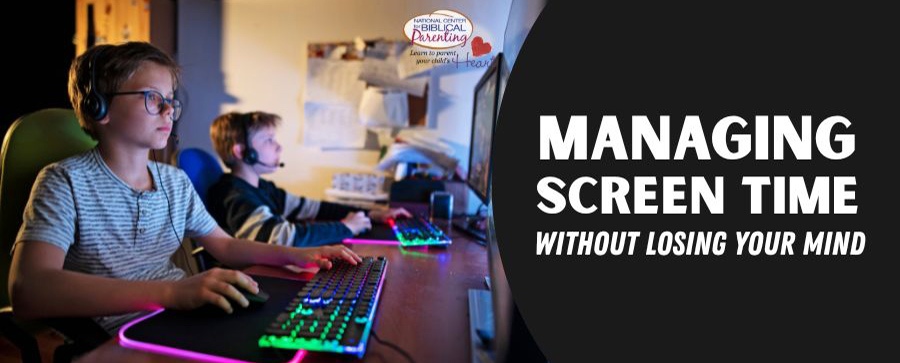Managing Screen Time Without Losing Your Mind

“Get off your phone!”
“Five more minutes!”
“Why can’t you just pause it?”
If you’re a parent of a teen or preteen, chances are you’ve had these conversations more times than you can count. Screen time battles have become the modern-day tug-of-war in many families, leaving both parents and children feeling frustrated, disconnected, and even defeated.
But what if the answer isn’t more rules or better apps? What if the solution lies deeper—in the heart?
The Real Problem Isn’t the Screen
It’s tempting to think that if we could just eliminate the games, control the internet, or remove the phones, peace would return. But the problem isn’t the screen itself—it’s what the screen is doing to your child’s inner world.
Most children don’t have the internal strength to manage electronics in a healthy way. That’s not a moral failure—it’s a maturity issue. Just like we don’t expect a 12-year-old to manage a credit card wisely, we can’t assume they’ll handle screen time responsibly without help.
Screens tap into the pleasure centers of the brain. They offer instant gratification, escape, and endless stimulation. Over time, this can rewire your child’s ability to deal with boredom, self-regulate emotions, and even delay gratification. The result? Screens become the “go-to” solution for stress, loneliness, or restlessness. And that’s a red flag.
Boredom Isn’t the Enemy—It’s the Beginning of Growth
One of the most powerful shifts you can make as a parent is to reframe boredom. Instead of trying to eliminate it, embrace it as a tool for character development.
Here’s a hard truth: moments of quiet often create anxiety in kids who are used to constant stimulation. That’s why pulling away a device can trigger outbursts, resistance, or emotional meltdowns. But boredom—when navigated well—can become the soil where creativity, problem-solving, and even spiritual reflection grow.
Rather than rushing to fill your child’s time, coach them through boredom. Help them identify internal resources they can draw from—imagination, curiosity, prayer, or simply resting in the quiet. When you do this, you’re training them to become less dependent on screens and more dependent on the tools God has already placed within them.
Try saying,
“You’re bored? That’s okay. Boredom gives your brain space to breathe and explore. Let’s see what your mind comes up with.”
Then resist the urge to rescue them. Let them learn the power of thinking, exploring, and creating without a screen.
Character Training Through Screen Time
Believe it or not, you can use technology as a vehicle for character growth. Every interaction with electronics is an opportunity to build skills that go far beyond screen management. Here are just a few examples:
- Follow Instructions – “When the timer goes off, it’s time to log off. Can you show me you can do that without reminders?”
- Accept ‘No’ as an Answer – “Sometimes we don’t get what we want. How can you respond with maturity when that happens?”
- Unselfishness – “Your sister wants a turn. What does it look like to honor others before yourself?”
- Integrity – “Are you using the device the way we agreed? Can I trust you?”
- Managing Emotions – “You seem upset that it’s over. How can you handle that disappointment wisely?”
- Receiving Correction – “Let’s talk about what happened yesterday. What could you do differently next time?”
Each of these responses shapes the heart. And when you focus on heart responses, you’re building life skills that will last long after the phone battery dies.
Don’t Avoid the Conflict—Prepare for It
Limiting electronics will likely create some friction in your home. That can be expected. But don’t shy away from the conflict—it’s an important part of the growth process. That doesn’t mean you have to fight. It may mean you just need to set firm boundaries and not get sucked into the ensuing drama.
Think of yourself as a coach, not a controller. You’re not just trying to manage behavior; you’re guiding your child to make wise decisions. That means setting limits and sticking to them, not because you want control, but because you want your child to thrive.
Here are a few heart-based principles that can help:
- Be Firm but Not Harsh – Your tone matters. You can hold the line without yelling.
- Don’t Take it Personally – Resistance is not rejection. Stay focused on training, not emotional reactions.
- Transfer Responsibility – When a child shows maturity, give them more freedom. When they don’t, pull it back.
- Use Natural Consequences – “If you can’t turn it off on time, maybe you’re not ready to use it today.”
Consistency over time builds security and teaches that boundaries are not barriers—they’re blessings.
You’re Not Alone—and It’s Not Too Late
You’re not the only one struggling with this. Parents across the world are dealing with the same challenges, especially as technology becomes more embedded in everyday life. The good news is, it’s never too late to start making changes.
Start with one small step:
- Choose one screen habit to address this week.
- Have a conversation, not a confrontation.
- Set a limit, explain the why, and stick with it.
You may face some pushback. That’s okay. Growth takes time, and every boundary you set with grace and confidence is a seed planted in your child’s heart.
Let’s raise the next generation with hearts that are strong—not just screen limits that work. on the heart, we move from managing behavior to discipling character. We create homes where respect, cooperation, and understanding flourish. And we give our children the tools they need to thrive—not just today, but for a lifetime.
Want More Practical Help?

If you’re ready to move beyond rules and consequences and embrace a heart-based approach to parenting, I’d love to invite you to explore How a Heart-Based Approach Changes Everything!
This package includes:
- 13 practical, biblical videos that address common parenting challenges
- A Leader’s Guide to equip small groups or family ministries
- An eBook packed with strategies, real-life stories, and insights
Whether you’re a parent looking for fresh tools, a church leader seeking resources for family discipleship, or a small group leader wanting to make a difference, this package has everything you need.
Use electronics management to build character and you’ll help children and young people develop the life-skills they’ll use for the rest of their lives.










Leave a Reply
Want to join the discussion?Feel free to contribute!